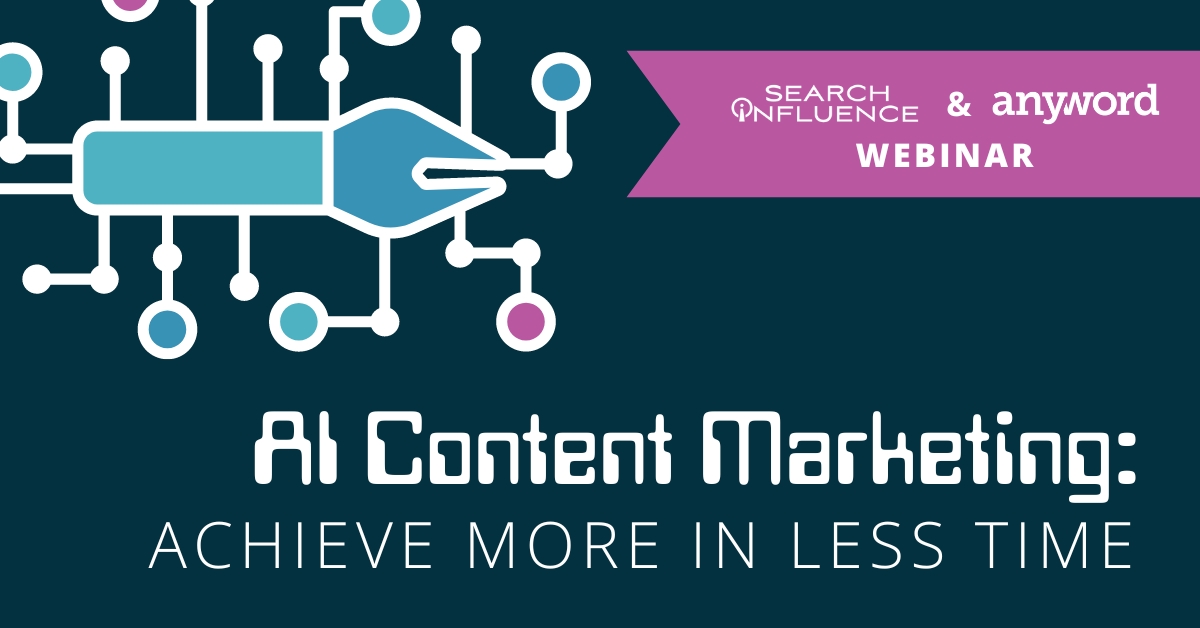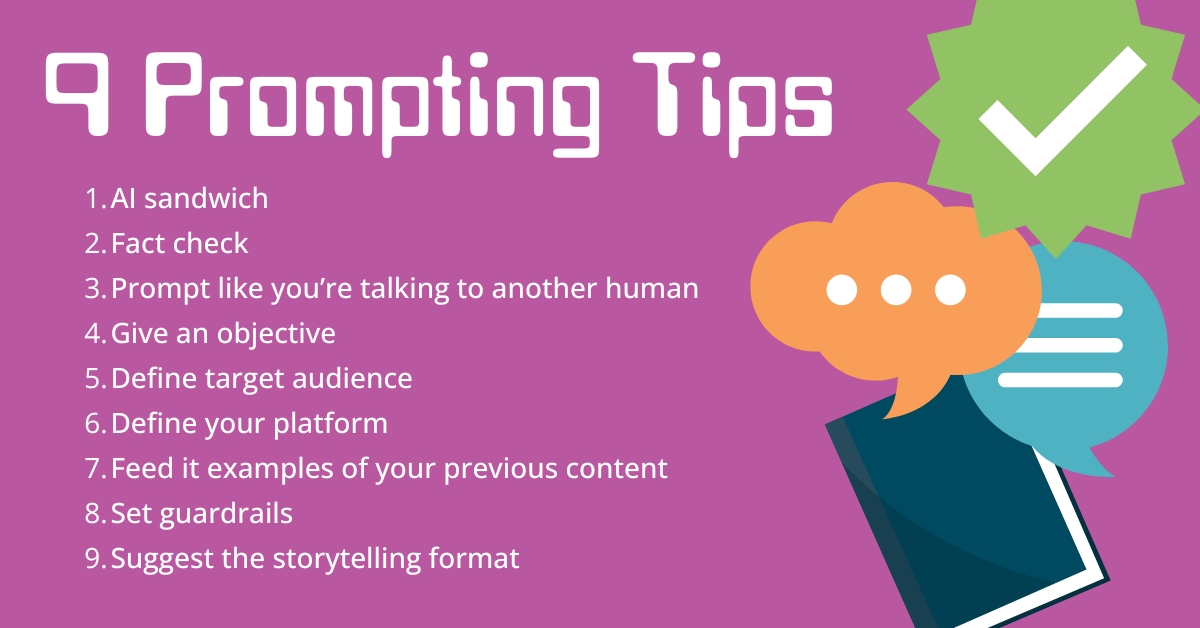AI Content Marketing: Achieve More in Less Time [ANYWORD X SEARCH INFLUENCE WEBINAR]
August 29th, 2024 by

Key Insights:
- AI content marketing is changing the way agencies, internal marketing departments, and freelancers go about their daily workflow.
- As more marketers add generative AI to their competitive toolkit, the gap between those who use AI versus those who don’t will grow. This makes jumping on the proverbial AI train today more crucial than ever.
- Search Influence uses a suite of data-driven AI tools, including Anyword, to complement our content creation processes, thus maximizing our efficiency while ensuring our content is performance-optimized.
- Just as AI has its benefits, it also has its limitations. To mitigate AI shortcomings, it’s important to maintain the magic touch of the human editor via the “AI sandwich.”
- Intuitive prompting can distinguish between content that meets expectations and content that falls short of them.
Over the course of history, countless tech advancements have reshaped how we view and approach our daily workload.
In the late 19th century, the invention of the tractor revolutionized the average farmer’s day-to-day by enhancing planting and harvesting efficiency, thus reducing the need for manual labor. In the mid-20th century, the introduction of ATMs made banking more accessible, minimizing the necessity for bank tellers to be available around the clock. Now, fast forward to the early 21st century, and generative AI tools are empowering content marketers to maximize their productivity and automate the creation of performance-driven copy, all in just a few keystrokes.
Recently, I had the pleasure of sitting down with our good friends at AI platform Anyword to discuss the impact of AI on content creation and how it helps our team work smarter. In our joint webinar “AI Performance Writing: How to Apply AI + Analytics to Your Content,” we dove deep into the state of AI content marketing, its opportunities and challenges, and how Search Influences uses data-driven tools like Anyword to better predict the success of our content collateral.
In case you missed it, here’s a quick overview of our action-packed discussion for your convenience, and maybe — just maybe — you’ll consider giving it a watch in your free time if you’re interested (100% shameless plug there).
The AI Train: Getting On or Getting Left Behind
Few industries will be as affected by generative AI as marketing. That is, if you look at some hot takes by sites like Hotjar, Spiceworks, and U.S. News & World Report… among many, many others.
The pressure is on many agencies, internal marketing departments, and freelancers to adopt AI into their daily workflows. This mounting pressure isn’t necessarily being applied from internal sources, but rather in the way the industry tides are naturally turning.
The data shows that more and more marketers are integrating AI into their daily tasks, whether it’s to help generate a punchy headline or to save time in their workload altogether. With a steady influx of marketers leveraging the power of AI, those who do not will inevitably feel the brunt of a competitive disadvantage.
Since generative AI first broke, Search Influence knew we couldn’t be one to miss the proverbial “AI train,” as it would only pass us right up on the route to our competitors. As Bora Tarimcilar, our Anyword webinar co-panelist and client support specialist, put it, “If you’re not on the train, there is this kind of sense of getting left behind.”
Anyword: The AI Software Built for Content Marketing
Search Influence started testing Anyword in 2023, at a time when generative AI was first starting to grow wings and take flight in the public eye. We set out on a mission to add another AI platform to our diverse suite of tools, which includes platforms like ChatGPT, Adobe Suite, Surfer SEO, and Google Gemini, among several others.
With Anyword, we’ve found success in creating performance-driven content that resonates with our clients and their audiences. The tool has since become one of many key strategy components for producing high-quality, impactful content.
Benefits of Using AI in Content Marketing
Investing in AI today has its payoffs tomorrow.
Timesaving for peak efficiency
The phrase “time is money” rings true in content marketing. We all wish we had more hours in the day, especially when deadlines are looming.
With AI as a +1 on our teams, we can now produce an entire ad campaign’s worth of copy in minutes versus the hours we’d have likely spent prior.
The faster we produce content, the more time we have to focus on strategy, optimization, and the bigger picture as a whole.
Relevant, competitive content
An important disclaimer: Generative AI is not a subject matter expert. It doesn’t have a degree, it doesn’t have any certifications, and it certainly doesn’t have real-world industry experience.
However, AI models do function by scraping the web for a “common consensus” on what to include in its outputs in response to your prompts.
For example, let’s say you’re writing a blog for your legal client titled, “When Should You See a Personal Injury Lawyer?” and you default to AI to help get you started. After receiving your prompt, the AI model will analyze a vast dataset of online content, including articles, legal blogs, FAQs, and expert opinions on personal injury law. It will then identify common themes, important legal terms, and frequently mentioned advice to construct a well-rounded response.
This helps ensure that the content you write is robust, researched, and in line with what your competitors are discussing. Plus, it may even help fill in some topic gaps that you’ve missed but your competitors haven’t.
A hub for brainstorming
Sometimes, the hardest part of content creation is simply getting that first word or sentence down.
AI tools are perfect for those “blank page” moments. Need a catchy headline or an engaging intro? Generative AI’s brainstorming capabilities can spark creativity and help overcome writer’s block, setting the stage for compelling content that doesn’t leave you with a headache.
If you’re not all in for AI automation, using tools for brainstorming purposes is one of the best use cases for getting your feet wet with this new tech. Even the best fires need an accelerant here and there, and AI is just that for your content creation process.
Challenges of AI Content Marketing
Despite all its benefits, AI content marketing is not without its limitations. To get the most value from an AI tool, you’ll need to know what to look out for — just as much as what to look for.
Robotic tendencies
AI is, in its truest form, just a robot. It’s not the kind you see in science fiction movies that are cynically threatening, but nonetheless, there’s no human behind the screen.
Generative AI is not capable of experiencing human emotion, and it naturally lacks empathy. Unless you give it highly detailed context, it won’t automatically know that you’re maybe speaking to an audience with highly sensitive needs, like, for example, those in the “Your Money or Your Life” category.
Because the model is not human, it also does not know how to distinguish fluff from lean, helpful content. With fluffy content, you lose the full extent your content can make on your audience simply by being generic and impactful. You’ll always need to bring humanness to the content, which also means double-checking that the content reads natural and conversational, not robotic.
AI buzzwords
“Unwavering,” “top-notch,” “a beacon of,” and so on — sometimes, it seems like AI has a few favorite words and a severely limited vocabulary.
With these “AI buzzwords” comes one inevitable pitfall: Your content ends up using the same adjectives to describe your brand or services as your competitors.
This can be beneficial in some areas, like when you’re trying to establish a place in the industry relative to your competitors, but it also leaves you with the risk of content that sounds the same as everyone else’s — thus affecting your ability to stand out.
At one point, these terms likely did do considerable justice to content, and some could even have been classified as power words. Now, however, their impact seems diluted due to overuse.
Machine hallucination
AI is, again, no subject matter expert, and it is capable of making mistakes.
The phenomenon “AI hallucination” occurs when an AI model generates content that is factually incorrect or nonsensical. This happens because the AI tries its best to create plausible-sounding information based on patterns it has learned, even if the actual data or facts do not exist.
ChatGPT even has a disclaimer that it can make mistakes, and to always check information that isn’t common knowledge.
By blindly trusting the facts and evidence AI provides you, you risk publishing inaccurate and possibly even offensive content that could harm your brand’s trustworthiness, authoritativeness, and overall bottom line.
Mitigating Common AI Shortcomings
Where there are problems, there are solutions.
The AI Sandwich
Generative AI is your teammate, it’s your dynamic +1, but it is not your replacement.
The human editor will always be necessary to create a human-like feel in the content, fact-check all information, and optimize it for maximum engagement.
At Search Influence, we like to call the relationship between the human and the AI model the “AI Sandwich.”*
The human (acting as the top bun or slice of bread) prompts the machine with all the important information it needs to produce a quality output, and then they wait as the machine gets to work (acting as the sandwich’s hearty sandwich ingredients — think lettuce, tomato, onion, cheese, and meat). Once the machine produces its output, the human editor (now acting as the bottom bun or slice of bread) goes behind it, cleans it up, personalizes it more to the brand, fact-checks it, and overall adds that human touch.
While the content is not produced top-to-bottom by a sole human writer, it is perfected by the human, which grants an overall stamp of approval that the copy meets quality standards.
*Learn more about the AI Sandwich and its use cases with Search Influence CEO, Will Scott, on the “Make Marketing Make Sense” podcast.
Practical prompting
If you’re worried about generic, impactful content and the overuse of AI buzzwords in your content, the solution starts with your prompt.
I’m a strong believer that the quality of your prompt determines the quality of your output. If you give the AI model a bare-bones prompt and expect it to fill in the gaps, it may do so in a way that doesn’t suit your brand or campaign goals.
I recommend you include these points to be as specific as possible with your prompts:
- Your campaign goal and keywords (if applicable)
- Your tone of voice and your target audience
- Your desired call to action
- Your desired word count
- Any terms you do or do not want to be included in your output
When you’re working with a platform like Anyword, with pre-built prompts, covering all your bases is simple. But if you aren’t using a tool with pre-built prompts provided, there are a ton of helpful articles, videos, and templates online that can get you started.

Dive Deeper Into AI Content Marketing
A very, very big thank you to Anyword for inviting me to join “AI Performance Writing: How to Apply AI + Analytics to Your Content.” I hope that you all are just as excited and geeked out as we are about this new wave of content marketing.
And, if you’re not, that’s perfectly okay. Just know the AI train does have a seat open for you.
Search Influence specializes in full-service content marketing, from SEO and paid advertising to email marketing, social media, and beyond. To learn more about how we’re using AI content marketing to drive client success at scale, get in touch with us today.

